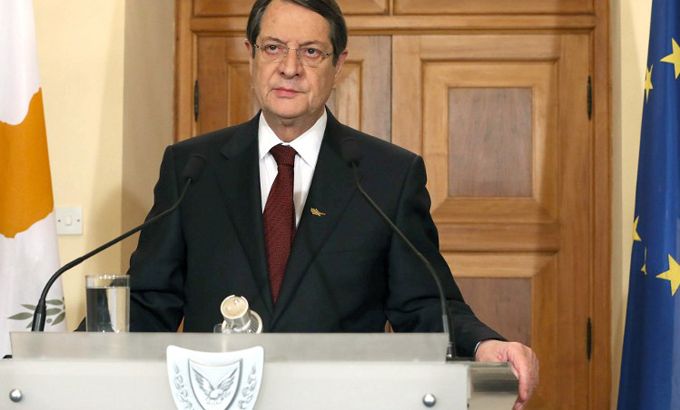Cyprus president defends tax bailout decision
Nicos Anastasiades says levy on bank deposits to save country’s economy is “less painful than the alternative”.

President Nicos Anastasiades of Cyprus has said the levy on bank deposits to save the country’s economy is not what he wanted but less painful than the alternative, which was bankruptcy.
In a televised address on Sunday evening Anastasiades also said he was trying to amend the terms of the EU bailout in order to limit the pain for small depositors.
“Cyprus is in a tragic situation. Who led the country to this situation is not to be discussed now,” the president said.
|
“I chose the least painful option, and I bear the political cost for this, in order to limit as much as possible the consequences for the economy and for our fellow Cypriots.“ – President Nicos Anastasiades |
“I chose the least painful option, and I bear the political cost for this, in order to limit as much as possible the consequences for the economy and for our fellow Cypriots.
“I completely share the unpleasant sentiment that this difficult and onerous decision has caused.”
The Cyprus government postponed to Monday an emergency session of parliament to discuss the levy on bank savings imposed to partially fund an international bailout needed to stave off bankruptcy.
State television said that Sunday’s parliamentary debate was postponed to “ensure MPs were fully aware of the situation and were better informed”.
The privately run Sigma TV said that Anastasiades was struggling to secure even a simple majority for the necessary legislation in parliament, in which his rightwing DISY party holds just 20 of the 56 seats.
Several parties in the 56-member chamber, where no party has an absolute majority, were meeting on Sunday morning to formulate positions over the bank levy. Three parties have already said they will not back the plan.
Bailout terms
The eurozone wants savers to pay up to 10 percent levy on bank deposits under terms for an international bailout to avoid bankruptcy.
The move, which would pave the way for a $13bn bailout, has sparked anger among savers who would be hard-hit by the plans.
Ministers are in a race to thrash out draft legislation ratifying the bailout and push it through parliament before banks reopen on Tuesday after a long holiday weekend, including a pre-Easter carnival on Sunday marred by the news.
It would be the first eurozone bailout in which private depositors would be forced to help foot the bill.
The debt rescue package, agreed with the eurozone and the International Monetary Fund early on Saturday after around 10 hours of talks in Brussels, was significantly less than the $22bn Cyprus had initially sought.
Cypriots emptied cashpoints after news emerged of bailout terms which broke previous eurozone taboo on protecting depositors in its efforts to address the regional debt crisis.
The tax on deposits in Cyprus, which accounts for only 0.2 percent of the eurozone’s economy, is expected to raise up to $7.7bn as a condition for the bailout, mainly needed to recapitalise banks.
Those affected will include rich Russians with deposits in Cyprus and Europeans who have retired to the island as well as the Cypriots themselves.
The size of foreign deposits in Cyprus – estimated at 37 percent of the total – was one reason the eurozone agreed to the tax on savings, to take effect on Tuesday. Cyprus stopped electronic transfers over the weekend.
‘Betrayed the people’
Newly elected Anastasiades said refusing the bailout would have led to the collapse of the island’s two largest banks, badly singed by their exposure to bailed-out neighbour Greece.
He said thousands of small businesses would also have gone bankrupt because of cash flow problems without the deal and the unprecedented bank levy.
Opposition leader George Lillikas has called on his supporters to protest on Tuesday, charging that the president who was elected only last month had “betrayed the people’s vote”.
| Al Jazeera’s Gerald Tan explains the Cyprus bailout |
Even the conservative leader’s partners in the ruling coalition had strong words against the deal.
“During our meeting it was stressed that the decision was… almost annihilating the Cypriot economy,” said Marios Garoyian , after chairing a meeting of his centrist DIKO party.
Stelios Kiliaris, chief economic adviser to DIKO, a partner to Cyprus’ governing body, told Al Jazeera that the island was already hit by EU measures to help out crisis-stricken Greece.
“Cyprus did not decide on this [levy on deposits]. It was the European Union that left it with no choice. It is something we didn’t expect. It is very unfair, Kiliaris said.
“When Greece was in trouble it took a haircut that had negative effects on our bonds. It led to the loss of about 25 percent of our GDP. And now we are faced with this new reality.”
The Bank of Cyprus, the island’s largest lender, said it was “absolutely understandable and justified for public opinion to be concerned”.